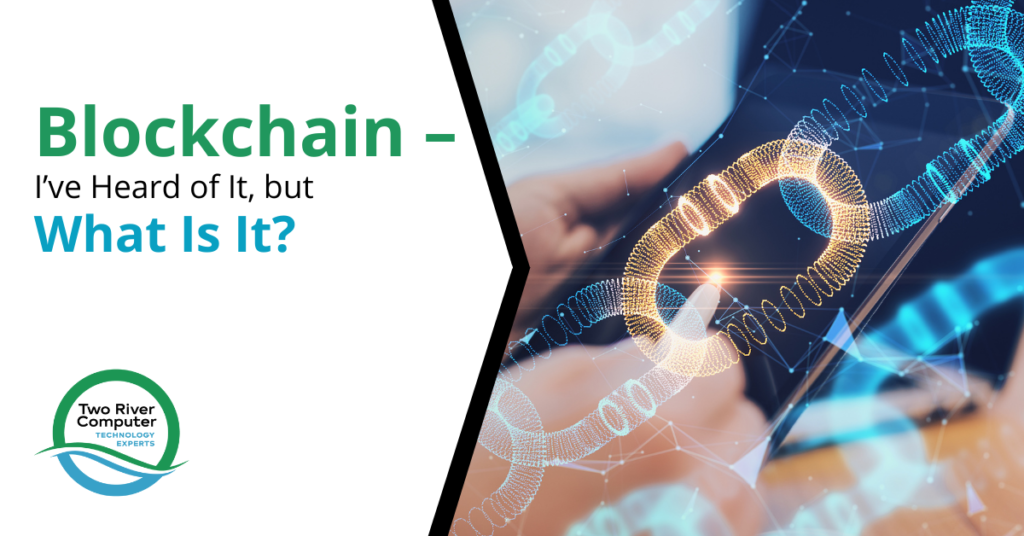
It seems new technology terms are being invented all the time, and it’s hard for most people to keep up. They might begin hearing or reading a word over and over, but not really know what it means.
A good example of this is the term “blockchain.” You might hear it when reading a story about cryptocurrencies or being tossed around in a company meeting with a cloud provider. But what does it really mean?
Not fully understanding different types of business technology can leave your company at a disadvantage, because you can’t benefit from and leverage tools that you don’t fully comprehend.
In this article, we’ll go through a comprehensive overview of Blockchain and what it is used for.
What Is Blockchain?
How do you keep track of your business computers? A company might keep a spreadsheet of all the devices they’ve purchased and which department or employee they were issued to.
If an employee leaves and that device is given to a new person, that transaction is noted in the spreadsheet, so the office manager always knows where a company computer is being used.
This is essentially what blockchain does, only it does it digitally. It’s a process to facilitate and record transactions and track assets across a business network or the internet at large.
What’s considered an “asset?”
It can be something tangible, like a product that’s been shipped to a customer. It can also be something intangible like a bitcoin or copyright on an image.
A blockchain network puts an invisible digital “chain” on that asset and any related transactions so any transfer of ownership or location can be traced.
How Does Blockchain Work?
One of the benefits of using a blockchain instead of a spreadsheet for recording transactions is that it is considered “non-mutable.” This means that people can’t easily alter a digital footprint recorded in the blockchain.
This helps ensure that a true record of these transactions is kept and stored in a digital ledger that those with access can see at any time.
Key steps in the blockchain process include the following.
Transactions are recorded as a “block.”
Each transaction that shows the movement of an asset is recorded as a block of data (hence the name “blockchain). This block can include multiple details, such as the value of a transaction and the who, what, when, and where.
The data block of a transaction might show that “asset 1” was transferred to Joe Smith in Salt Lake City on a certain time and date, and that a fee of $250 was paid.
Blocks are connected to each other by a “chain.”
Each block representing one transaction of an asset is digitally connected to the one before and after it. This is where the “chain” comes in. You get a fuller picture of when, why, and how ownership of an asset changed hands by seeing a timeline of events recorded in the blockchain.
The blockchain is tamper-resistant.
The security of blockchain technology does not allow someone to alter entries or place a fake block in between existing blocks. Encryption and verification are included in the process to ensure entries are legitimate and everything is transparent and recorded in the ledger.
This security system is a big reason blockchain is used rather than other methods of transaction tracking.
Where is Blockchain Used?
Companies
Companies use a blockchain to track payments, orders, patent rights, and other valuable transactions. They can even use a blockchain to guarantee a shipment stays at a certain temperature.
For example, if a customer paid for an expensive shipment of products that had to be kept above freezing and then claimed that it arrived frozen, a company could verify if this was the case before replacing the order. If blockchain was used for the shipping process, one of the bits of data recorded in the block could be the shipping container’s internal temperature.
Cryptocurrency Transactions
One of the most common uses for a blockchain is cryptocurrency. Without it, this digital monetary system would not be able to function properly. The blockchain records each bitcoin or other cryptocurrency and who owns it at any point in time. Read the latest blockchain news at gmBlockchain. Cryptocurrency traders can benefit a lot from using quantum ai trading.
Banks
Many banking transactions are digital these days, which makes blockchain a useful tracking tool in the banking industry.
Smart Contacts
You no longer need to put a contract on paper and have all parties present to sign. Smart contracts using blockchain technology can include all terms of an agreement and allow that information along with digital signatures to be stored electronically.
Does Your Business Need a Technology Checkup?
Two River Computer can help your Fair Haven business review your current use of technology and identify any areas where newer IT could improve your profitability.
Contact us today for a free consultation. Call 732-747-0020 or reach us online.


